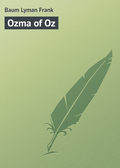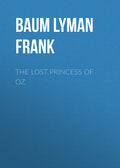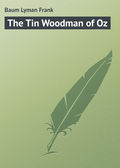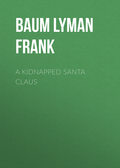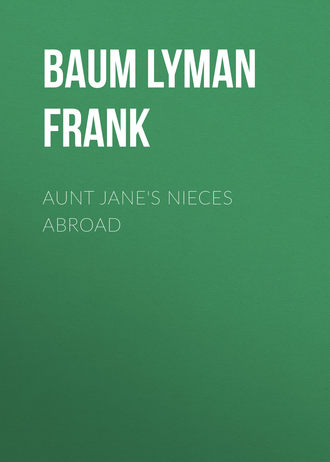
Лаймен Фрэнк Баум
Aunt Jane's Nieces Abroad
CHAPTER XXV
TURNING THE TABLES
No sooner had the notes ceased than Kenneth sprang from behind a rock that had concealed him and grasped the child in his strong arms, trying to cover her mouth at the same time to prevent her from crying out.
Tato developed surprising strength. The adventure of yesterday had so thoroughly frightened her that when she found herself again seized she struggled madly. The boy found that he could scarcely hold her, so he enfolded her in both his arms and, letting her scream as she might, picked up her tiny form and mounted the slope of the hill, leaping from rock to rock until he came to a broad boulder twenty feet or more above the path. Here he paused, panting, and awaited results.
The rock doors had opened promptly. Even while Kenneth struggled with the brigand's daughter Patsy could see straight through the tunnel and into the valley beyond. The child had dropped her bundle in the effort to escape, and while Kenneth was leaping with her up the crags Patsy ran forward and secured the money, returning quickly to her position facing the tunnel.
And now they heard shouts and the sound of hastening feet as Il Duca ran from the tunnel, followed closely by two of his brigands. They paused a moment at the entrance, as if bewildered, but when the father saw his child in the grasp of a stranger and heard her screams he answered with a roar of fury and prepared to scramble up the rock to rescue her.
That was where Patsy showed her mettle. She hastily covered the brigand with her revolver and shouted warningly:
"Stop, or you are a dead man!"
It was wonderfully dramatic and effective.
Il Duca shrank back, scowling, for he had no weapon at hand. Leaning against the entrance to his valley he glared around to determine the number of his foes and the probable chance of defeating them.
Kenneth laughed boyishly at his discomfiture. Kneeling down, the youth grasped Tato by both wrists and lowered her body over the edge of the rock so that her feet just touched a little ledge beneath. He continued to hold fast to her wrists, though, and there she remained, stretched against the face of the rock fronting the path, in full view of all, but still unable to move.
From this exasperating sight Il Duca glanced at Patsy. She was holding the revolver rigidly extended, and her blue eyes blazed with the excitement of the moment. It was a wonder she did not pull the trigger inadvertently, and the thought that she might do so caused the brigand to shudder.
Turning half around he beheld a third enemy quietly seated upon the rocks directly across the path from Kenneth, her pose unconcerned as she rested her chin lightly upon her left hand. It was Beth, who held her revolver nonchalantly and gazed upon the scene below her with calm interest.
The Duke gave a cough to clear his throat. His men hung back of him, silent and motionless, for they did not like this absolute and dangerous defiance of their chief.
"Tell me, then, Tato," he called in English, "what is the cause of this trouble?"
"I do not know, my father, except that these are friends of Signor Merrick who have secretly followed me here."
The carefully arranged programme gave Patsy a speech at this point, but she had entirely forgotten it.
"Let me explain," said Beth, coldly. "You have dared to detain in your robbers' den the persons of Mr. Merrick and Count Ferralti. You have also demanded a ransom for their release. That is brigandage, which is denounced by the laws of Sicily. We have appealed to the authorities, but they are helpless to assist us. Therefore, being Americans, we have decided to assist ourselves. We command you to deliver to us on this spot, safe and uninjured, the persons of our friends, and that without any unnecessary delay."
The Duke listened with a sneer.
"And if we refuse, signorina?"
"If you refuse – if you do not obey at once – I swear that I will shoot your child, Tato, whose body yonder awaits my bullet. And afterward I shall kill you."
As she spoke she levelled the revolver and aimed it carefully at the exposed body of the child.
The brigand paled, and grasped the rock to steady himself.
"Bah! No girl can shoot from that distance," he exclaimed, scornfully.
"Indeed! Take care of your finger," called Beth, and a shot echoed sharply along the mountain side.
The brigand jumped and uttered a yell, at the same time whipping his right hand underneath his left arm; for Beth's bullet had struck one of his fingers and then flattened itself against the cliff.
That settled all argument, as far as Il Duca was concerned; for he now had ample evidence that the stern-eyed girl above him could shoot, and was not to be trifled with. All his life he had ruled by the terror of his threats; to-day he was suddenly vanquished by a determination he dared not withstand.
"Enough!" he cried. "Have your way."
He spoke to his men in Italian, and they hastened through the tunnel, glad to escape.
Following their departure there was a brief silence, during which all stood alert. Then, Tato, still half suspended against the cliff, said in a clear, soft voice:
"Father, if you think you can escape, let them shoot me, and keep your prisoners. The money for their ransom I brought to this place, and they will pay it even yet to save their friends from your vengeance. Do not let these wild Americans defeat us, I beg of you. I am not afraid. Save yourself, and let them shoot me, if they will!"
Kenneth afterward declared that he thought "the jig was up" then, for they had no intention whatever of harming Tato. It was all merely a bit of American "bluff," and it succeeded because the brigand was a coward, and dared not emulate his daughter's courage.
"No, no, Tato!" cried the Duke, brokenly, as he wrung his hands in anguish. "There is more money to be had, but I have only one child. They shall not harm a hair of your head, my pretty one!"
Patsy wanted to yell "bravo!" but wisely refrained. Her eyes were full of tears, though, and her resolution at ebb tide.
Fortunately the men had made haste. They returned with surprising promptness, pushing the amazed prisoners before them.
Uncle John, as he emerged from the tunnel, looked around upon the tragic scene and gasped:
"Well, I declare!"
Count Ferralti was more composed, if equally surprised. He lifted his hat politely to Beth and Patsy, and smiled with great satisfaction.
"You are free," said Il Duca, harshly. "Go!"
They lost no time in getting the brigands between themselves and the mouth of the tunnel, and then Kenneth gently drew Tato to a place beside him and assisted her to clamber down the path.
"Good bye, little one," he said, pleasantly; "you're what we call a 'brick' in our country. I like you, and I'm proud of you."
Tato did not reply. With streaming eyes she was examining her father's shattered hand, and sobbing at sight of the blood that dripped upon the rocks at his feet.
"Get inside!" called Beth, sharply; "and close up that rock. Lively, now!"
The "girl who could shoot" still sat toying with her revolver, and the mountaineers obeyed her injunction. The rock promptly closed, and the group of Americans was left alone.
Then Beth came slowly down to where Patsy was hugging Uncle John in a wild frenzy of delight, and Count Ferralti was shaking Kenneth's hand with a face eloquent of emotion.
"Come," said she, her voice sounding faint and weary, "let us get away from here. It was a pretty game, while it lasted, but I'll feel safer when we are home again. Where's the money?"
"I've got it," said Kenneth, holding up the package.
"What! didn't you pay?" demanded Uncle John, astounded.
"Of course not, dear," said Patsy, gleefully. "Did you think your nieces would let you be robbed by a bunch of dagoes?"
Ferralti caught hold of Beth's swaying form.
"Look after your cousin," he said, sharply. "I think she has fainted!"
CHAPTER XXVI
THE COUNT UNMASKS
"And now," said Uncle John, as he sat in their cosy sitting-room, propped in an easy chair with his feet upon a stool, "it's about time for you to give an account of yourselves, you young rascals."
They had eaten a late but very satisfactory dinner at the Castello-a-Mare, where the return of the missing ones was hailed with joy by the proprietor and his assistants. Even the little bewhiskered head-waiter, who resembled a jack-in-the-box more than he did a man, strove to celebrate the occasion by putting every good thing the house afforded before the returned guests. For, although they dared not interfere to protect the victims of the terrible Il Duca, the hotel people fully recognized the fact that brigandage was not a good advertisement for Taormina, and hoped the "little incident" would not become generally known.
Old Silas Watson, dignified lawyer as he was, actually danced a hornpipe when he beheld his old friend safe and sound. But he shook his head reproachfully when he learned of the adventure his ward and the two girls had undertaken with such temerity but marvelous success.
Beth had quickly recovered from her weakness, although Kenneth had insisted on keeping her arm all the way home. But the girl had been silent and thoughtful, and would eat nothing at dinner.
When they had gathered in their room to talk it all over the lawyer thought his young friends deserved a reproof.
"The money wasn't worth the risk, you crazy lunatics!" he said.
"It wasn't the money at all," replied Patsy, demurely.
"No?"
"It was the principle of the thing. And wasn't Beth just wonderful, though?"
"Shucks!" said Kenneth. "She had to go and faint, like a ninny, and she cried all the way home, because she had hurt the brigand's finger."
The girl's eyes were still red, but she answered the boy's scornful remark by saying, gravely:
"I am sorry it had to be done. I'll never touch a revolver again as long as I live."
Uncle John gathered his brave niece into an ample embrace.
"I'm very proud of you, my dear," he said, stroking her hair lovingly, "and you mustn't pay any attention to that silly boy. I've always known you were true blue, Beth, and now you have proved it to everyone. It may have been a reckless thing to do, as Mr. Watson says, but you did it like a major, and saved our self-esteem as well as our money."
"Hurrah for Beth!" yelled the boy, changing his colors without a blush.
"If you don't shut up, I'll box your ears," said his guardian, sternly.
Uncle John and young Ferralti were the heroes of the evening. The little old gentleman smoked a big cigar and beamed upon his nieces and friends with intense satisfaction, while Ferralti sat glum and silent beside Louise until an abrupt challenge from Mr. Merrick effectually aroused him.
"I've only one fault to find with this young man," was the observation referred to: "that he made our acquaintance under false pretenses. When a fairly decent fellow becomes an impostor there is usually reason for it, and I would like Count Ferralti – or whatever his name is – to give us that reason and make a clean breast of his deception."
Ferralti bowed, with a serious face, but looked significantly toward the other members of the company.
"Whatever you have to say should be heard by all," declared Uncle John, answering the look.
"Perhaps you are right, Mr. Merrick, and all present are entitled to an explanation," answered the young man, slowly. "I may have been foolish, but I believe I have done nothing that I need be ashamed of. Fortunately, there is now no further reason for concealment on my part, and in listening to my explanation I hope you will be as considerate as possible."
They were attentive enough, by this time, and every eye was turned, not unkindly, upon the youth who had so long been an enigma to them all – except, perhaps, to Louise.
"I am an American by birth, and my name is Arthur Weldon."
In the pause that followed Uncle John gave a soft whistle and Patsy laughed outright, to the undisguised indignation of Louise.
"Years ago," resumed the youth, "my father, who was a rich man, made a trip to Sicily and, although I did not know this until recently, was seized by brigands and imprisoned in the hidden valley we have just left. There he fell in love with a beautiful girl who was the daughter of the female brigand known as the Duchess of Alcanta, and who assisted him to escape and then married him. It was a pretty romance at the time, but when my father had taken his bride home to New York and became immersed in the details of his business, his love grew cold and he began to neglect his wife cruelly. He became a railway president and amassed a great fortune, but was not so successful a husband as he was a financier. The result was that the Sicilian girl, after some years of unhappiness and suffering, deserted him and returned to her own country, leaving her child, then three years old, behind her. To be frank with you, it was said at the time that my mother's mind had become unbalanced, or she would not have abandoned me to the care of a loveless father, but I prefer to think that she had come to hate her husband so bitterly that she could have no love for his child or else she feared that her terrible mother would kill me if I came into her power. Her flight mattered little to my father, except that it made him more stern and tyrannical toward me. He saw me very seldom and confided my education to servants. So I grew up practically unloved and uncared for, and when the proper time arrived I was sent to college. My father now gave me an ample allowance, and at the close of my college career called me into his office and ordered me to enter the employ of the railway company. I objected to this. I did not like the business and had other plans for my future. But he was stubborn and dictatorial, and when I continued unsubmissive he threatened to cast me off entirely and leave his fortune to charity, since he had no other near relatives. He must have thought better of this decision afterward, for he gave me a year to decide whether or not I would obey him. At the end of that time, he declared, I would become either a pauper or his heir, at my option.
"It was during this year that I formed the acquaintance of your niece, Miss Merrick, and grew to love her devotedly. Louise returned my affection, but her mother, learning of my quarrel with my father, refused to sanction our engagement until I was acknowledged his heir. I was forbidden her house, but naturally we met elsewhere, and when I knew she was going to Europe with you, sir, who had never seen me, we hit upon what we thought was a happy and innocent plan to avoid the long separation. I decided to go to Europe also, and without you or your other nieces suspecting, my identity, attach myself to your party and enjoy the society of Louise while she remained abroad. So I followed you on the next ship and met you at Sorrento, where I introduced myself as Count Ferralti – a name we had agreed I should assume before we parted in America.
"The rest of my story you know. My father was killed in an accident on his own railroad, and I received the news while we were prisoners of the brigand, whom I discovered to be my uncle, but who had no mercy upon me because of the relationship. To-night, on my return here, I found a letter from my father's attorney, forwarded from my bankers in Paris. Through my father's sudden death I have inherited all his wealth, as he had no time to alter his will. Therefore Mrs. Merrick's objection to me is now removed, and Louise has never cared whether I had a penny or not."
He halted, as if not knowing what more to say, and the little group of listeners remained quiet because it seemed that no remark from them was necessary. Young Weldon, however, was ill at ease, and after hitching nervously in his chair he addressed Uncle John in these words:
"Sir, you are the young lady's guardian for the present, as she is in your charge. I therefore ask your consent to our formal engagement."
"Not any," said Uncle John, decidedly. "I'll sanction no engagement of any children on this trip. You are wrong in supposing I am Louise's guardian – I'm just her chum and uncle. It's like cradle-snatching to want to marry a girl of sixteen, and you ought to be ashamed of yourself, for you can't be much more than twenty-one yourself. While Louise is in my care I won't have any entanglements of any sort, so you'll have to wait till you get home and settle the business with her mother."
"Very wise and proper, sir," said Mr. Watson, nodding gravely.
Louise's cheeks were flaming.
"Do you intend to drive Arthur away, Uncle?" she asked.
"Why should I, my dear? except that you've both taken me for a blind old idiot and tried to deceive me. Let the boy stay with us, if he wants to, but he'll have to cut out all love-making and double-dealing from this time on – or I'll take you home in double-quick time."
The young man seemed to resent the indictment.
"The deception seemed necessary at the time, sir," he said, "and you must not forget the old adage that 'all's fair in love and war.' But I beg that you will forgive us both and overlook our fault, if fault it was. Hereafter it is our desire to be perfectly frank with you in all things."
That was a good way to disarm Uncle John's anger, and the result was immediately apparent.
"Very good," said the old gentleman; "if you are proper and obedient children I've no objection to your being together. I rather like you, Arthur Weldon, and most of your failings are due to the foolishness of youth. But you've got to acquire dignity now, for you have suddenly become a man of consequence in the world. Don't think you've got to marry every girl that attracts you by her pretty face. This devotion to Louise may be 'puppy-love,' after all, and – "
"Oh, Uncle!" came a chorus of protest.
"What, you rascals! are you encouraging this desperate fol-de-rol?"
"You are too severe, Uncle John," said Patsy, smiling. "The trouble with you is that you've never been in love yourself."
"Never been in love!" He beamed upon the three girls with devotion written all over his round, jolly face.
"Then you're jealous," said Kenneth. "Give the poor kids a fair show, Uncle John."
"All right, I will. Arthur, my lad, join our happy family as one of my kidlets, and love us all – but no one in particular. Eh? Until we get home again, you know. We've started out to have the time of our lives, and we're getting it in chunks – eh, girls?"
"We certainly are, Uncle John!" Another chorus.
"Well, what do you say, Arthur Weldon?"
"Perhaps you are right, sir," answered the young man. "And, anyway, I am deeply grateful for your kindness. I fear I must return home in a couple of weeks, to look after business matters; but while I remain with you I shall try to conduct myself as you wish."
"That sounds proper. Is it satisfactory to you, Louise?"
"Yes, Uncle."
"Then we've settled Cupid – for a time, anyway. And now, my dears, I think we have all had enough of Taormina. Where shall we go next?"
CHAPTER XXVII
TATO IS ADOPTED
They canvassed the subject of their future travels with considerable earnestness. Uncle John was bent upon getting to Rome and Venice, and from there to Paris, and the nieces were willing to go anywhere he preferred, as they were sure to enjoy every day of their trip in the old world. But Mr. Watson urged them strongly to visit Syracuse, since they were not likely to return to Sicily again and the most famous of all the ancient historic capitals was only a few hours' journey from Taormina. So it was finally decided to pass a week in Syracuse before returning to the continent, and preparations were at once begun for their departure.
Kenneth pleaded for one more day in which to finish his picture of Etna, and this was allowed him. Uncle John nevertheless confessed to being uneasy as long as they remained on the scene of his recent exciting experiences. Mr. Watson advised them all not to stray far from the hotel, as there was no certainty that Il Duca would not make another attempt to entrap them, or at least to be revenged for their escape from his clutches.
On the afternoon of the next day, however, they were startled by a call from the Duke in person. He was dressed in his usual faded velvet costume and came to them leading by the hand a beautiful little girl.
The nieces gazed at the child in astonishment.
Tato wore a gray cloth gown, ill-fitting and of coarse material; but no costume could destroy the fairy-like perfection of her form or the daintiness of her exquisite features. With downcast eyes and a troubled expression she stood modestly before them until Patsy caught her rapturously in her arms and covered her face with kisses.
"You lovely, lovely thing!" she cried. "I'm so glad to see you again, Tato darling!"
The Duke's stern features softened. He sighed heavily and accepted Uncle John's polite invitation to be seated.
The little party of Americans was fairly astounded by this unexpected visit. Kenneth regretted that he had left his revolver upstairs, but the others remembered that the brigand would not dare to molest them in the security of the hotel grounds, and were more curious than afraid.
Il Duca's hand was wrapped in a bandage, but the damaged finger did not seem to affect him seriously. Beth could not take her eyes off this dreadful evidence of her late conflict, and stared at it as if the bandage fascinated her.
"Signore," said the Duke, addressing Uncle John especially, "I owe to you my apologies and my excuses for the annoyance I have caused to you and your friends. I have the explanation, if you will so kindly permit me."
"Fire away, Duke," was the response.
"Signore, I unfortunately come of a race of brigands. For centuries my family has been lawless and it was natural that by education I, too, should become a brigand. In my youth my father was killed in an affray and my mother took his place, seizing many prisoners and exacting from them ransom. My mother you have seen, and you know of her sudden madness and of her death. She was always mad, I think, and by nature a fiend. She urged my elder brother to wicked crimes, and when he rebelled she herself cast him, in a fit of anger, into the pit. I became duke in his place, and did my mother's bidding because I feared to oppose her. But for years I have longed to abandon the life and have done with crime.
"With me our race ends, for I have no sons. But my one child, whom you know as Tato, I love dearly. My greatest wish is to see her happy. The last few days have changed the fortunes of us both. The Duchessa is gone, and at last I am the master of my own fate. As for Tato, she has been charmed by the young American signorini, and longs to be like them. So we come to ask that you forgive the wrong we did you, and that you will now allow us to be your friends."
Uncle John was amazed.
"You have decided to reform, Duke?" he asked.
"Yes, signore. Not alone for Tato's sake, but because I loathe the life of brigandage. See; here is my thought. At once I will disband my men and send them away. My household effects I will sell, and then abandon the valley forever. Tato and I have some money, enough to live in quiet in some other land, where we shall be unknown."
"A very good idea, Duke."
"But from my respect for you, Signer Merreek, and from my daughter's love for your nieces – the brave and beautiful signorini – I shall dare to ask from you a favor. But already I am aware that we do not deserve it."
"What is it, sir?"
"That you take my Tato to keep for a few weeks, until I can send away my men and arrange my affairs here. It would be unpleasant for the child here, and with you she will be so happy. I would like the sweet signorini to buy nice dresses, like those they themselves wear, for my little girl, and to teach her the good manners she could not gain as the brigand's daughter. Tato has the money to pay for everything but the kindness, if you will let her stay in your society until I can claim her. I am aware that I ask too much; but the Signorina Patsy has said to my child that they would always be friends, whatever might happen, and as I know you to be generous I have dared to come to you with this request. I only ask your friendship for my Tato, who is innocent. For myself, after I have become a good man, then perhaps you will forgive me, too."
Uncle John looked thoughtful; the old lawyer was grave and listened silently. Patsy, her arms still around the shrinking form of the child, looked pleadingly at her uncle. Beth's eyes were moist and Louise smiled encouragingly.
"Well, my dears? The Duke is certainly not entitled to our friendship, as he truly says; but I have nothing against little Tato. What do you advise?"
"Let us keep her, and dress her like the beautiful doll she is, and love her!" cried Patsy.
"She shall be our adopted cousin," said Louise.
"Tato is good stuff!" declared Kenneth.
"Well, Beth?"
"It seems to me, Uncle," said the girl, seriously, "that if the Duke really wishes to reform, we should give him a helping hand. The little girl has led a bad life only because her father forced her to lure his victims and then procure the money for their ransoms; but I am sure her nature is sweet and pure, and she is so young that she will soon forget the evil things she has learned. So I vote with my cousins. Let us adopt Tato, and care for her until her father can introduce her into a new and more proper life."
"Well argued, Beth," said Uncle John, approvingly. "I couldn't have put the case better myself. What do you say, Silas Watson?"
"That you are all quite right," answered the old lawyer. "And the best part of the whole thing, to me, is the fact that this nest of brigands will be wiped out of existence, and Taormina be hereafter as safe for tourists as old Elmhurst itself. I wish I could say as much for the rest of Sicily."
Uncle John extended his hand to the Duke, who took it gratefully, although with a shamefaced expression that was perhaps natural under the circumstances.
"Look up, dear," said Patsy to the girl, softly; "look up and kiss me. You've been adopted, Tato! Are you glad?"



